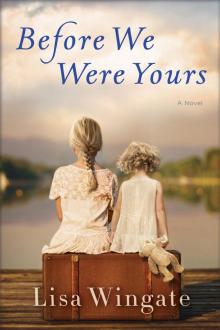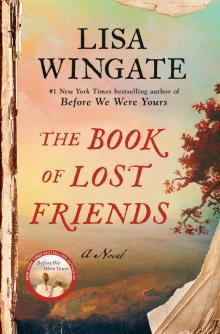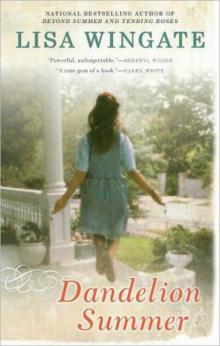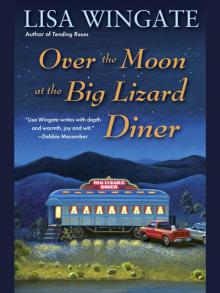- Home
- Lisa Wingate
The Book of Lost Friends Page 2
The Book of Lost Friends Read online
Page 2
So, I do.
Seems like just a minute goes by before a big hand circles my arm, and it’s me getting dragged ’cross the floor. My shoulder wrenches loose with a pop. The heels of my Christmas shoes furrow the dirt like plow blades.
“No! Mama! Help me!” My blood runs wild. I fight and scream, catch Mama’s arm, and she catches mine.
Don’t let go, my eyes tell hers. Of a sudden, I understand the big man’s words and how come they broke Mama down. Two gotta go today. In two dif’ernt lots. One at a time.
This is the day the worse happens. Last day for me and Mama. Two gets sold here and one goes on with Jep Loach, to get sold at the next place down the road. My stomach heaves and burns in my throat, but ain’t nothing there to retch up. I make water down my leg, and it fills up my shoe and soaks over to the dirt.
“Please! Please! Us two, together!” Mama begs.
The man kicks her hard, and our hands rip apart at the weave. Mama’s head hits the logs, and she crumples in the little dents from all them other feet, her face quiet like she’s gone asleep. A tiny brown poke dangles in her hand. Three blue beads roll loose in the dust.
“You give me any trouble, and I’ll shoot her dead where she lies.” The voice runs over me on spider legs. Ain’t the trader’s man that’s got me. It’s Jep Loach. I ain’t being carried to the block. I’m being took to the devil wagon. I’m the one he means to sell at the someplace farther on.
I tear loose, try to run back to Mama, but my knees go soft as wet grass. I topple and stretch my fingers toward the beads, toward my mother.
“Mama! Mama!” I scream and scream and scream….
* * *
—
It’s my own voice that wakes me from the dream of that terrible day, just like always. I hear the sound of the scream, feel the raw of it in my throat. I come to, fighting off Jep Loach’s big hands and crying out for the mother I ain’t laid eyes on in twelve years now, since I was a six-year-old child.
“Mama! Mama! Mama!” The word spills from me three times more, travels out ’cross the night-quiet fields of Goswood Grove before I clamp my mouth closed and look back over my shoulder toward the sharecrop cabin, hoping they didn’t hear me. No sense to wake everybody with my sleep-wanderings. Hard day’s work ahead for me and Ol’ Tati and what’s left of the stray young ones she’s raised these long years since the war was over and we had no mamas or papas to claim us.
Of all my brothers and sisters, of all my family stole away by Jep Loach, I was the only one Marse Gossett got back, and that was just by luck when folks at the next auction sale figured out I was stole property and called the sheriff to hold me until Marse could come. With the war on, and folks running everywhere to get away from it, and us trying to scratch a living from the wild Texas land, there wasn’t any going back to look for the rest. I was a child with nobody of my own when the Federal soldiers finally made their way to our refugee place in Texas and forced the Gossetts to read the free papers out loud and say the war was over, even in Texas. Slaves could go where they pleased, now.
Old Missus warned all us we wouldn’t make it five miles before we starved or got killed by road agents or scalped by Indians, and she hoped we did, if we’d be ungrateful and foolish enough to do such a thing as leave. With the war over, there wasn’t no more need to refugee in Texas, and we’d best come back to Louisiana with her and Marse Gossett—who we was now to call Mister, not Marse, so’s not to bring down the wrath of Federal soldiers who’d be crawling over everything like lice for a while yet. Back on the old place at Goswood Grove, we would at least have Old Mister and Missus to keep us safe and fed and put clothes on our miserable bodies.
“Now, you young children have no choice in the matter,” she told the ones of us with no folk. “You are in our charge, and of course we will give you the benefit of transporting you away from this godforsaken Texas wilderness, back to Goswood Grove until you are of age or a parent comes to claim you.”
Much as I hated Old Missus and working in the house as keeper and plaything to Little Missy Lavinia, who was a trial of her own, I rested in the promise Mama had spoke just two years before at the trader’s yard. She’d come to find me, soon’s she could. She’d find all us, and we’d string Grandmama’s beads together again.
And so I was biddable but also restless with hope. It was the restless part that spurred me to wander at night, that conjured evil dreams of Jep Loach, and watching my people get stole away, and seeing Mama laid out on the floor of the trader’s pen. Dead, for all I could know then.
For all I still do know.
I look down and see that I been walking in my sleep again. I’m standing out on the old cutoff pecan stump. A field of fresh soil spreads out, the season’s new-planted crop still too wispy and fine to cover it. Moon ribbons fall over the row tips, so the land is a giant loom, the warp threads strung but waiting on the weaving woman to slide the shuttle back and forth, back and forth, making cloth the way the women slaves did before the war. Spinning houses sit empty now that store-bought calico comes cheap from mills in the North. But back in the old days when I was a little child, it was card the cotton, card the wool. Spin a broach of thread every night after tromping in from the field. That was Mama’s life at Goswood Grove. Had to be or she’d have Old Missus to deal with.
This stump—this very one—was where the slave driver stood to watch the gangs work the field, cowhide whip dangling down like a snake ready to bite, keep everybody picking the cotton rows. Somebody lag behind, try to rest a minute, the driver would find them out. If Old Marse Gossett was home, they’d only get a little breshin’ with the whip. But if Marse Gossett was off in New Orleans, where he kept his other family everybody knew about but didn’t dare to speak of, then look out. The whipping would be bad, because Old Missus was in charge. Missus didn’t like it that her husband had him a plaçage woman and a fawn-pale child down in New Orleans. Neighborhoods like Faubourg Marigny and Tremé—the rich planter men kept their mistresses and children there. Fancy girls, quadroons and octoroons. Women with dainty bones and olive-brown skin, living in fine houses with slaves to look after them, too.
Old ways like that been almost gone in these years since Mr. Lincoln’s war ended. The slave driver and his whip, Mama and the field gangs working from see to can’t see, leg irons, and auction sales like the ones that took my people—all that’s a thing in the barely back of my mind.
Sometimes when I wake, I think all my people were just somethin’ I pretended, never real at all. But then I touch the three glass beads on the cord at my neck, and I tell their names in the chant. Hardy gone at Big Creek to a man from Woodville, Het at Jatt…
All the way down to Baby Rose and Mary Angel. And Mama.
It was real. We were real. A family together.
I look off in the distant, wobble twixt a six-year-old body and one that’s eighteen years growed, but not so much different. Still skinny as if I was carved out of sticks.
Mama always did say, Hannie, you stand behind the broom handle, I can’t even see you there. Then she’d smile and touch my face and whisper, But you a beautiful child. Always been pretty. I hear it like she’s there beside of me, a white oak basket on her arm, bound for the garden patch out behind our little cabin, last one down the end of the old quarters.
Just as quick as I feel her there, she’s gone again.
“Why didn’t you come?” My words hang in the night air. “Why didn’t you come for your child? You never come.” I sink down on the stump’s edge and look out toward the trees by the road, their thick trunks hid in sifts of moon and fog.
I think I see something in it. A haint, could be. Too many folk buried under Goswood soil, Ol’ Tati says when she tells us tales in the cropper cabin at night. Too much blood and sufferin’ been left here. This place always gonna have ghosts.
A horse nickers low. I see a rider on
the road. A dark cloak covers the head and sweeps out, light as smoke.
That my mama, come to find me? Come to say, You almost eighteen years old, Hannie. Why you still settin’ on that same ol’ stump? I want to go to her. Go away with her.
That Old Mister, come home from fetching his wicked son out of trouble again?
That a haint, come to drag me off and drown me in the river?
I close my eyes, shake my head clear, look again. Nothing there but a drift of fog.
“Child?” Tati’s whisper comes from a ways off, worried, careful-like. “Child?” Don’t matter your age, if Tati raised you, you stay child to her. Even the strays that’ve growed up and moved on, they’re still child, if they come to visit.
I cock my ear, open my mouth to answer her, but then I can’t.
Somebody is there—a woman by the high white pillars at the Goswood gate, afoot now. The oaks whisper overhead, like it’s worried their old bones to have her come to the drive. A low-hung branch grabs her hood and her long, dark hair floats free.
“M-mama?” I say.
“Child?” Tati whispers again. “You there?” I hear her hurry along, her walking stick tapping faster till she’s found me.
“I see Mama coming.”
“You dreamin’, sugar.” Tati’s knobby fingers wrap my wrist, gentle-like, but she keeps a distant. Sometimes, my dreams let go with a fight. I wake kicking and clawing to get Jep Loach’s hand off my arm. “Child, you all right. You just walkin’ in the dream. Wake up, now. Mama ain’t here, but Ol’ Tati, she right here. You safe.”
I glance away from the gates, then back. The woman’s gone, and no matter how hard I look, I can’t see her.
“Wake up, now, child.” In moonglow, Tati’s face is the red-brown of cypress wood pulled up from the deep water, dark against the sack-muslin cap over her silvery hair. She slides a shawl off her arm, reaches it round me. “Out here in the field in all the wetness! Get a pleurisy. Where all us be with that kind of troublement? Who Jason gonna settle in with, then?”
Tati nudges me with the cane stick, pestering. The thing she wants most is for Jason and me to marry. Once the ten years on the sharecrop contract with Old Mister is done and the land is hers, Tati needs somebody to hand it down to. Me and the twins, Jason and John, are the last of her strays. One more growing season is all that’s left for the contract, but Jason and me? We been raised in Tati’s house like brother and sister. Hard to see things any other way, but Jason is a good boy. Honest worker, even if both him and John did come into this world a shade slower minded than most.
“I ain’t dreamin’,” I say when Tati tugs me from the stump.
“Devil, you ain’t. Come on back, now. We got work waitin’ in the mornin’. Gonna tie your ankle to the bed, you don’t stop dealing me this night misery. You been worser lately. Worser in these walkin’ dreams than when you was a li’l thing.”
I jerk against Tati’s arm, remembering all the times as a child I wandered from my sleep pallet by Missy Lavinia’s crib, and woke up to Old Missus whipping me with the kitchen spoon or a riding whip or a iron pot hook from the fireplace. Whatever was close by.
“Hesh, now. You can’t help it.” Tati scoops down for a pinch of dirt to throw over her shoulder. “Put it behind you. New day comin’ and plenty to do. C’mon now, throw you a pinch your ownself, to be safe.”
I do what she says and then make the cross over my chest, and Tati does, too. “Father, Son, Holy Ghost,” we whisper together. “Guide us and protect us. Keep us ahead and behind. Ever and ever. Amen.”
I hadn’t ought to, then—bad business to look back for a haint once you throwed ground twixt you and it—but I do. I glance at the road.
I’m cold all over.
“What you doin’?” Tati near trips when I stop so sudden.
“I wasn’t dreamin’,” I whisper, and I don’t just look. I point, but my hand shakes. “I was lookin’ at her.”
CHAPTER 2
BENEDETTA SILVA—AUGUSTINE, LOUISIANA, 1987
The truck driver lays on his horn. Brakes squeal. Tires hopscotch across asphalt. A stack of steel pipe leans in slow-motion, testing the grease-encrusted nylon binders that hold the load. One strap breaks loose and whips in the breeze as the truck skids toward the intersection.
Every muscle in my body goes stiff. I brace for impact, fleetingly imagining what might be left of my rusted-out VW Beetle after the collision.
The truck wasn’t there an instant ago. I’d swear it wasn’t.
Who did I list as the emergency contact in my employee file?
I remember the pen tip hovering over the blank line, the moment of painful, ironic indecision. Maybe I never filled in the space.
The world passes by in acute detail—the heavyset crossing guard with her blue-white hair and stooped-over body, thrusting the handheld stop sign. Wide-eyed kids motionless in the intersection. Books slip from a grade-school boy’s skinny arm, tumbling, tumbling, hitting, scattering. He stumbles, hands splayed, disappears behind the pipe truck.
No. No, no, no! Please, no. My teeth clench. I close my eyes, turn my face away, yank the steering wheel, stomp harder on the brake, but the Bug keeps sliding.
Metal strikes metal, folds and crinkles. The car bumps over something, front wheels, then back. I feel my head collide with the window and then the roof.
It can’t be. It can’t.
No, no, no.
The Bug hits the curb, bounces off, then stops, the engine rumbling, rubber smoke filling the car.
Move, I tell myself. Do something.
I picture a little body in the street. Red sweatpants, too warm for the day. Faded blue T-shirt, oversized. Warm brown skin. Big dark eyes, lifeless. I noticed him yesterday in the empty schoolyard, that boy with the impossibly long eyelashes and freshly shaved head, sitting all alone by the tumbledown concrete block fence after the older kids had picked up their new class schedules and dispersed to do whatever kids do in Augustine, Louisiana, on the last day of summer.
Is that little guy okay? I’d asked one of the other teachers, the pasty-faced, sour-lipped one who’d repeatedly avoided me in the hall as if I were giving off a bad smell. Is he waiting for somebody?
Who knows? she’d muttered. He’ll find his way home.
Time snaps into place. The metallic taste of blood tightens the back of my mouth. I’ve bitten my tongue, I guess.
There’s no screaming. No siren. No outcry for somebody to call 911.
I yank the gearshift into neutral, engage the emergency brake, make sure it’s going to hold before I unfasten the seatbelt, grab the handle, and ram the door with my shoulder until it finally opens. I tumble into the street, catching myself on numb feet and legs.
“What’d I tell you?” The crossing guard’s voice is toneless, almost languid compared to the spiraling pulse in my neck. “What’d I tell you?” she demands again, hands on her hips as she traverses the crosswalk.
I look first at the intersection. Books, squashed lunch box, plaid thermos. That’s all.
That’s it.
No body. No little boy. He’s standing on the curb. A girl who might be his older sister, perhaps thirteen or fourteen, has him by a fistful of clothing, so that he’s stretched on tippy-toe, an incongruously distended belly hanging bare beneath the hem of his T-shirt.
“What sign I gave you just now?” The crossing guard slaps a palm hard against the four-letter word STOP, then thrusts the placard within inches of his face.
The little boy shrugs. He looks more bewildered than terrified. Does he know what almost happened? The teenage girl, who probably saved his life, seems annoyed as much as anything else.
“Idjut. Look out for the trucks.” She shoves him forward a step onto the sidewalk, then releases her grip and wipes a palm on her jeans. Tossing back a handful of long, glos
sy dark braids with red beads on the ends, she glances toward the intersection, blinks at what I now realize is the Bug’s bumper lying in the street, the morning’s only casualty. That’s what I ran over. Not a little boy. Only metal and nuts and bolts. A minor miracle.
The pipe-truck driver and I will exchange insurance information—I hope it won’t matter that mine is out of state still—and the day will go on. He’s probably as relieved as I am. More, since he’s the one who ran the intersection. His insurance should take care of this. Good thing, considering that I can’t even afford to cough up my deductible. Between renting one of the few houses in my price range and splitting the cost of a U-Haul with a friend who was on her way to Florida, I’m tapped out until my first paycheck comes in.
The squeal of grinding gears catches me by surprise. I turn in time to watch the pipe truck disappear down the highway.
“Hey!” I yell, and run a few yards after it. “Hey! Come back here!”
The chase proves futile. He’s not stopping, the pavement is slick with the condensation of a humid south Louisiana summer morning, and I’m in sandals and a prairie skirt. The blouse I carefully ironed atop moving boxes is plastered to my skin by the time I stop.
An upscale SUV rolls by. The driver, a big-haired blonde, gapes at me, and my stomach turns over. I recognize her from the staff welcome meeting two days ago. She’s a school board member, and given my last-minute employment offer and the chilly reception so far, it’s no stretch to assume that I wasn’t her first choice for the job…or anyone else’s. Compounded with the fact that we all know why I’m here in this backwater little burg, it probably doesn’t bode well for my surviving the probationary period of the teaching contract.
“You never know until you try.” I bolster myself with the line from “Lonely People,” a hit-parade anthem of my 1970s childhood, and I walk back toward the school. Oddly, life is moving along as if nothing happened. Cars roll by. The crossing guard does her job. She pointedly avoids looking my way as a school bus turns in.

 Before We Were Yours
Before We Were Yours A Sandy’s Seashell Shop Christmas
A Sandy’s Seashell Shop Christmas The Book of Lost Friends
The Book of Lost Friends Larkspur Cove
Larkspur Cove The Sea Glass Sisters
The Sea Glass Sisters The Language of Sycamores
The Language of Sycamores Dandelion Summer
Dandelion Summer Word Gets Around
Word Gets Around Beyond Summer
Beyond Summer Firefly Island
Firefly Island The Tidewater Sisters: Postlude to The Prayer Box
The Tidewater Sisters: Postlude to The Prayer Box Talk of the Town
Talk of the Town![Blue Sky Hill [01] A Month of Summer Read online](http://i1.bookreadfree.com/i1/03/29/blue_sky_hill_01_a_month_of_summer_preview.jpg) Blue Sky Hill [01] A Month of Summer
Blue Sky Hill [01] A Month of Summer A Thousand Voices
A Thousand Voices Over the Moon at the Big Lizard Diner
Over the Moon at the Big Lizard Diner Never Say Never
Never Say Never Good Hope Road
Good Hope Road The Summer Kitchen
The Summer Kitchen A Month of Summer
A Month of Summer Blue Moon Bay
Blue Moon Bay Drenched in Light
Drenched in Light The Sea Keeper's Daughters
The Sea Keeper's Daughters